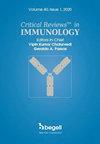增压NK细胞作为一种有希望的治疗策略来靶向和消除儿科患者侵袭性DIPG肿瘤。
IF 0.9
4区 医学
Q4 IMMUNOLOGY
引用次数: 0
摘要
弥漫性内生性脑桥胶质瘤(DIPG)是儿科患者常见的死亡原因。在本报告中,我们讨论了增压NK (sNK)细胞单独或联合其他治疗方法靶向此类侵袭性儿童脑肿瘤的作用,提示单独使用sNK细胞作为治疗和预防侵袭性儿童脑肿瘤复发的潜在治疗策略。本文章由计算机程序翻译,如有差异,请以英文原文为准。
Supercharged NK Cells as a Promising Therapeutic Strategy to Target and Eliminate Aggressive DIPG Tumors in Pediatric Patients.
Diffuse intrinsic pontine glioma (DIPG) is the common cause of death in pediatric patients. In this report, we discussed the role of supercharged NK (sNK) cells alone or in combination with other therapies to target such aggressive pediatric brain tumors, suggesting the potential use of sNK cells alone as a therapeutic strategy in treating and preventing the recurrence of aggressive pediatric brain tumors.
求助全文
通过发布文献求助,成功后即可免费获取论文全文。
去求助
来源期刊
CiteScore
2.60
自引率
0.00%
发文量
14
审稿时长
>12 weeks
期刊介绍:
Immunology covers a broad spectrum of investigations at the genes, molecular, cellular, organ and system levels to reveal defense mechanisms against pathogens as well as protection against tumors and autoimmune diseases. The great advances in immunology in recent years make this field one of the most dynamic and rapidly growing in medical sciences. Critical ReviewsTM in Immunology (CRI) seeks to present a balanced overview of contemporary adaptive and innate immune responses related to autoimmunity, tumor, microbe, transplantation, neuroimmunology, immune regulation and immunotherapy from basic to translational aspects in health and disease. The articles that appear in CRI are mostly obtained by invitations to active investigators. But the journal will also consider proposals from the scientific community. Interested investigators should send their inquiries to the editor before submitting a manuscript.

 求助内容:
求助内容: 应助结果提醒方式:
应助结果提醒方式:


